人教新目标九年级上册unit 6When was it invented Section A 3a-3c课件(共23张PPT)
文档属性
| 名称 | 人教新目标九年级上册unit 6When was it invented Section A 3a-3c课件(共23张PPT) | 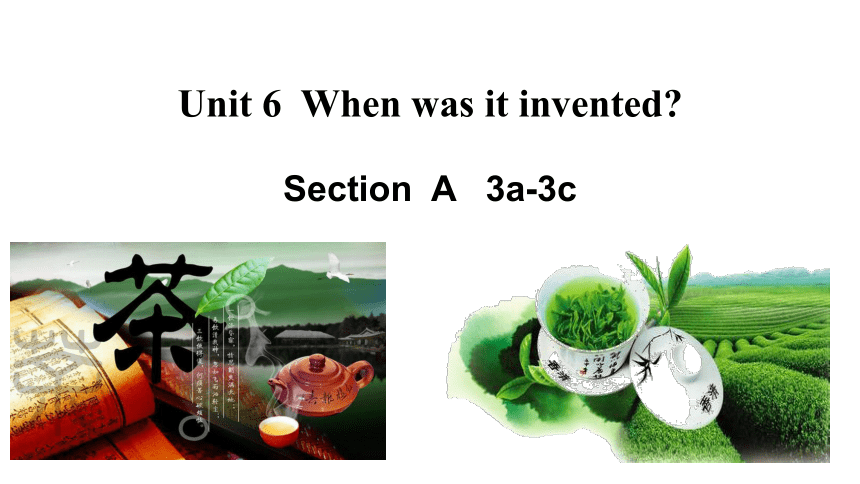 | |
| 格式 | pptx | ||
| 文件大小 | 1.7MB | ||
| 资源类型 | 教案 | ||
| 版本资源 | 人教新目标(Go for it)版 | ||
| 科目 | 英语 | ||
| 更新时间 | 2023-10-24 13:42:25 | ||
图片预览

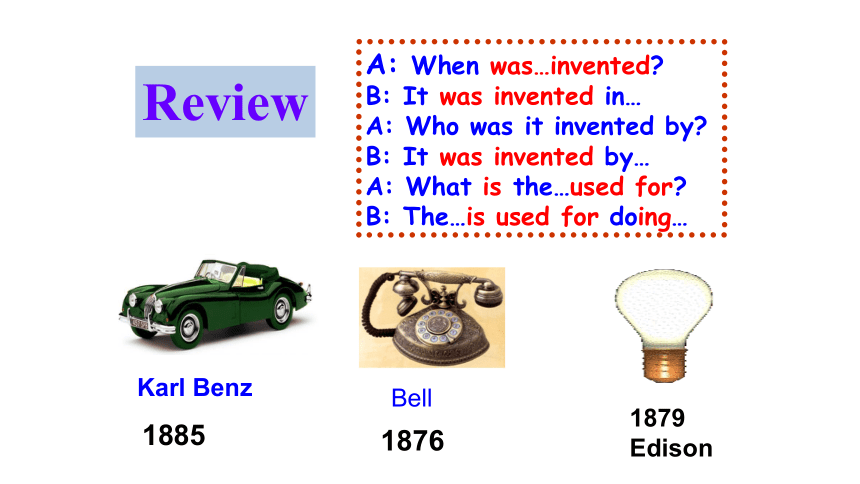
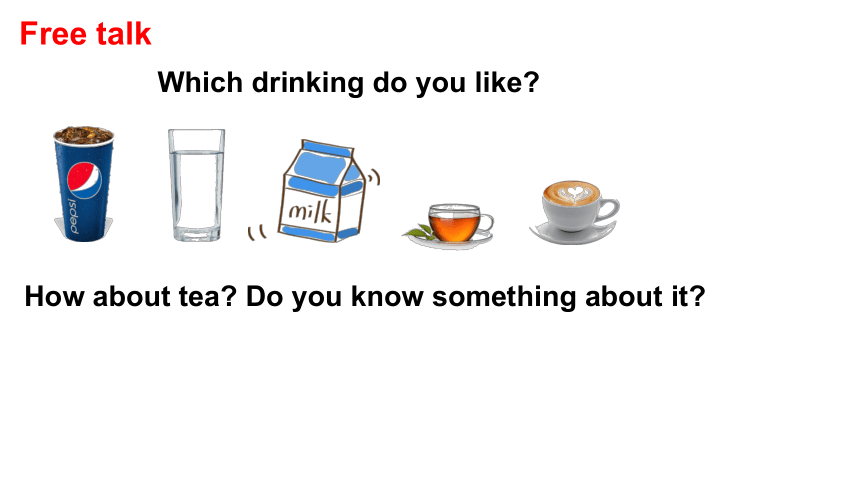
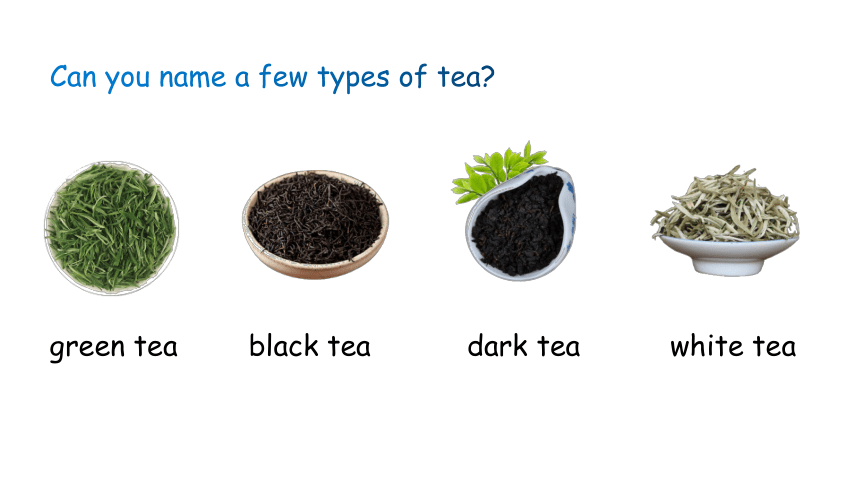

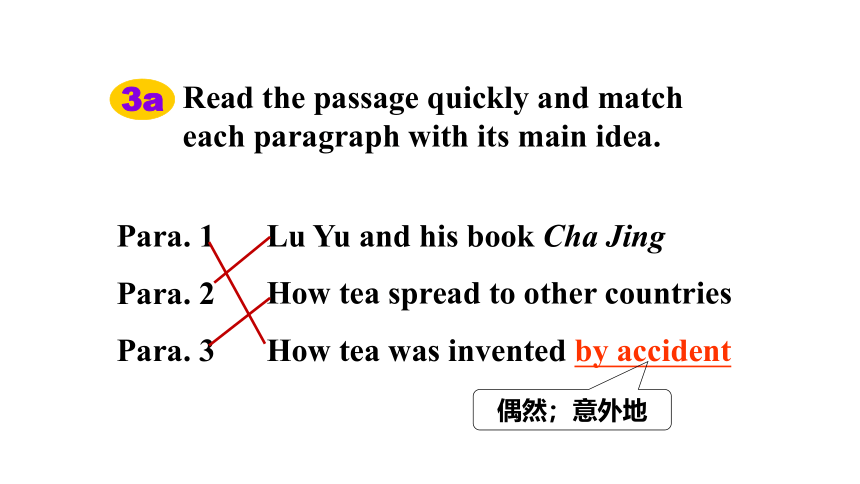
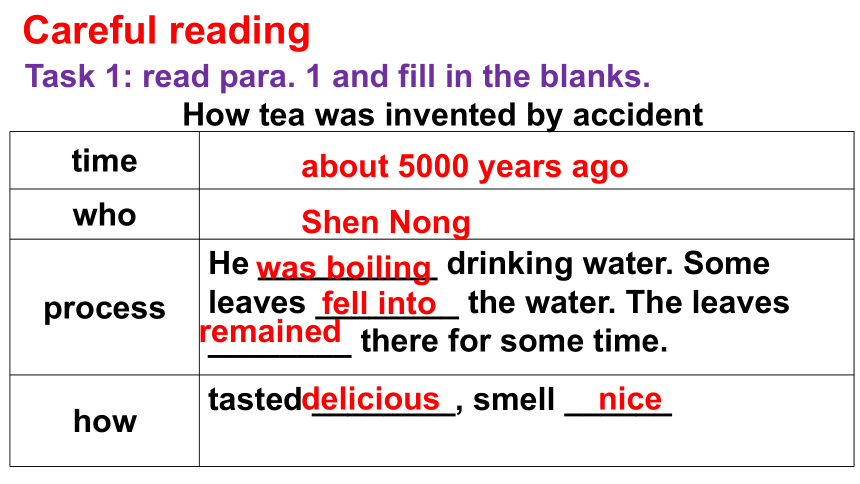
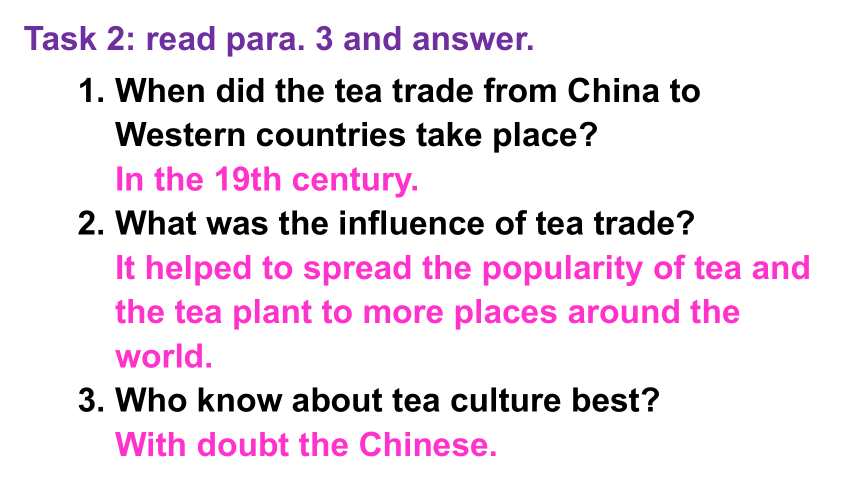
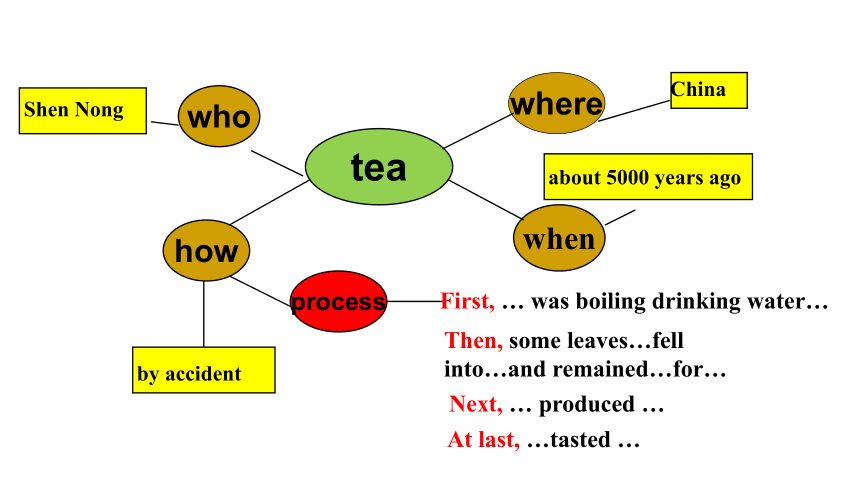
文档简介
(共23张PPT)
Unit 6 When was it invented
Section A 3a-3c
Karl Benz
1885
1876
Bell
A: When was…invented
B: It was invented in…
A: Who was it invented by
B: It was invented by…
A: What is the…used for
B: The…is used for doing…
1879
Edison
Review
Free talk
Which drinking do you like
How about tea Do you know something about it
Can you name a few types of tea
green tea
black tea
dark tea
white tea
Some questions about tea:
Tea was first invented in ______.
Tea comes from ________.
Tea trees mostly grow in the _____ of China.
Tea was brought to the Western world in ____.
China
tea tree
south
1610
Read the passage quickly and match each paragraph with its main idea.
Para. 1
Para. 2
Para. 3
Lu Yu and his book Cha Jing
How tea spread to other countries
How tea was invented by accident
偶然;意外地
3a
Careful reading
Task 1: read para. 1 and fill in the blanks.
How tea was invented by accident
time
who
process He __________ drinking water. Some leaves ________ the water. The leaves ________ there for some time.
how tasted ________, smell ______
about 5000 years ago
Shen Nong
was boiling
fell into
remained
delicious
nice
Task 2: read para. 3 and answer.
1. When did the tea trade from China to
Western countries take place
In the 19th century.
2. What was the influence of tea trade
It helped to spread the popularity of tea and
the tea plant to more places around the
world.
3. Who know about tea culture best
With doubt the Chinese.
tea
who
how
where
when
process
Shen Nong
by accident
about 5000 years ago
First, … was boiling drinking water…
Then, some leaves…fell into…and remained…for…
Next, … produced …
At last, …tasted …
China
An Accidental Invention
Did you know that tea, the most popular drink in the
world (after water), was invented by accident Many
people believe that tea was first drunk about 5,000 years ago.
主句
that引导的宾语从句
作tea的同位语
= by chance偶然;意外
Analyze the passage
It is said that a Chinese ruler called Shen Nong was the first to discover tea as a drink. One day
Shen Nong was boiling drinking water over an open fire. Some leaves from a tea plant fell into the water and remained there for some time.
it是形式主语
that引导的从句是真正的主语
过去分词短语作后置定语
It is said that … = people say that … 据说……
拓展:It is believed that … 人们认为/相信……
It is reported that … 据报道……
It is known that … 众所周知……
fall into 落入;陷入
拓展:fall asleep 睡着
fall behind 落后
fall down 跌倒;倒塌
It produced a nice smell so he tasted the brown water. It was quite delicious, and so, one of the world’s favorite drinks was invented.
one of … ……之一,作主语时,谓语动词用单数形式。
拓展:one of the+形容词最高级+可数名词复数
最……的……之一
A few thousand years later, Lu Yu, “the saint of tea”, mentioned Shen Nong in his book Cha Jing. The book describes how tea plants were grown and used to make tea. It also discussed where the finest tea leaves were produced and what kinds of water were used.
几千年以后
It is believed that tea was brought to Korea and Japan during the 6th and 7th centuries. In England, tea didn’t appear until around 1660, but in less than 100 years, it had become the national drink. The tea trade from China to Western countries took place in the 19th century. This helped to
less than少于
反义词:more than
take place发生;出现
不接宾语,也不用于被动语态
spread the popularity of tea and the tea plant to more places around the world. Even though many
people now know about tea culture, the Chinese are without doubt the ones who best understand the nature of tea.
Even through引导的让步状语从句
who引导的定语从句, 修饰先行词the ones
3. Who is called “the saint of tea”
_______
Read the passage again and answer the
questions.
1. When was tea first drunk
__________________________________________
2. How was tea invented
____________________
It was first drunk about 5,000 years ago.
It was invented by accident.
Lu Yu.
n. 圣人,圣徒
3b
4. What is Cha Jing about
____________________________________
____________________________________
____________________________________
____________________________________
5. When was tea brought to other countries ____________________________________
____________________________________
____________________________________
The book describes how tea plants were grown and used to make tea. It also discusses where the finest tea leaves were produced and what kinds of water were used.
Tea was brought to Korea and Japan during the 6th and 7th centuries. It was
brought to England at around 1660.
1. One of the world’s favorite drinks was _________ by accident.
2. Tea was first ________ by Shen Nong about 5,000 years ago.
Complete the sentences with the correct forms of the verbs in the box.
invent, drink, bring, produce, trade
invented
drunk
3c
3. A nice smell was _________ when the tea leaves dropped into the hot water.
4. Tea was ________ to Korea and Japan during the 6th and 7th centuries.
5. Tea is now ______ between many different countries.
traded
produced
brought
invent, drink, bring, produce, trade
完成句子
1. 我只是偶然发现那只丢失的小猫。
I only found the missing cat _______ ________ .
2. 根据最近的一项调查,每年有上百万的人死于与吸烟有关的
疾病。
____________ ___ a recent survey, millions of people die
from diseases linked to smoking each year.
by
accident
According to
3. 茶是偶然被发明的。
Tea was _______ _______ _________.
4. 这样,世界上最受欢迎的饮料之一被发明了。
So one of the world’s favorite drinks _______ _________ .
5. 据说神农在室外火炉上烧开水时发现了茶。
______ ______ _______ that Shen Nong __________ tea when
he was boiling drinking water over an open fire.
invented
by
accident
was
invented
It is said
discovered
1. I didn’t pass the physics exam last month. ________, how do you study for a physics test
A. By accident B. By mistake
C. By the way D. By the time
2. There is no ____ that phones play an important role in the modern life.
A. question B. problem C. answer D. doubt
C
D
选择题
3. — I’m afraid I can’t get there before 9 o’clock.
— That’s OK. There’s __________ .
A. no way B. no wonder C. no doubt D. no hurry
4. Great changes _______ in Tongren in the past five years.
A. have happened B. have taken place
C. have been happened D. have been taken place
D
B
Unit 6 When was it invented
Section A 3a-3c
Karl Benz
1885
1876
Bell
A: When was…invented
B: It was invented in…
A: Who was it invented by
B: It was invented by…
A: What is the…used for
B: The…is used for doing…
1879
Edison
Review
Free talk
Which drinking do you like
How about tea Do you know something about it
Can you name a few types of tea
green tea
black tea
dark tea
white tea
Some questions about tea:
Tea was first invented in ______.
Tea comes from ________.
Tea trees mostly grow in the _____ of China.
Tea was brought to the Western world in ____.
China
tea tree
south
1610
Read the passage quickly and match each paragraph with its main idea.
Para. 1
Para. 2
Para. 3
Lu Yu and his book Cha Jing
How tea spread to other countries
How tea was invented by accident
偶然;意外地
3a
Careful reading
Task 1: read para. 1 and fill in the blanks.
How tea was invented by accident
time
who
process He __________ drinking water. Some leaves ________ the water. The leaves ________ there for some time.
how tasted ________, smell ______
about 5000 years ago
Shen Nong
was boiling
fell into
remained
delicious
nice
Task 2: read para. 3 and answer.
1. When did the tea trade from China to
Western countries take place
In the 19th century.
2. What was the influence of tea trade
It helped to spread the popularity of tea and
the tea plant to more places around the
world.
3. Who know about tea culture best
With doubt the Chinese.
tea
who
how
where
when
process
Shen Nong
by accident
about 5000 years ago
First, … was boiling drinking water…
Then, some leaves…fell into…and remained…for…
Next, … produced …
At last, …tasted …
China
An Accidental Invention
Did you know that tea, the most popular drink in the
world (after water), was invented by accident Many
people believe that tea was first drunk about 5,000 years ago.
主句
that引导的宾语从句
作tea的同位语
= by chance偶然;意外
Analyze the passage
It is said that a Chinese ruler called Shen Nong was the first to discover tea as a drink. One day
Shen Nong was boiling drinking water over an open fire. Some leaves from a tea plant fell into the water and remained there for some time.
it是形式主语
that引导的从句是真正的主语
过去分词短语作后置定语
It is said that … = people say that … 据说……
拓展:It is believed that … 人们认为/相信……
It is reported that … 据报道……
It is known that … 众所周知……
fall into 落入;陷入
拓展:fall asleep 睡着
fall behind 落后
fall down 跌倒;倒塌
It produced a nice smell so he tasted the brown water. It was quite delicious, and so, one of the world’s favorite drinks was invented.
one of … ……之一,作主语时,谓语动词用单数形式。
拓展:one of the+形容词最高级+可数名词复数
最……的……之一
A few thousand years later, Lu Yu, “the saint of tea”, mentioned Shen Nong in his book Cha Jing. The book describes how tea plants were grown and used to make tea. It also discussed where the finest tea leaves were produced and what kinds of water were used.
几千年以后
It is believed that tea was brought to Korea and Japan during the 6th and 7th centuries. In England, tea didn’t appear until around 1660, but in less than 100 years, it had become the national drink. The tea trade from China to Western countries took place in the 19th century. This helped to
less than少于
反义词:more than
take place发生;出现
不接宾语,也不用于被动语态
spread the popularity of tea and the tea plant to more places around the world. Even though many
people now know about tea culture, the Chinese are without doubt the ones who best understand the nature of tea.
Even through引导的让步状语从句
who引导的定语从句, 修饰先行词the ones
3. Who is called “the saint of tea”
_______
Read the passage again and answer the
questions.
1. When was tea first drunk
__________________________________________
2. How was tea invented
____________________
It was first drunk about 5,000 years ago.
It was invented by accident.
Lu Yu.
n. 圣人,圣徒
3b
4. What is Cha Jing about
____________________________________
____________________________________
____________________________________
____________________________________
5. When was tea brought to other countries ____________________________________
____________________________________
____________________________________
The book describes how tea plants were grown and used to make tea. It also discusses where the finest tea leaves were produced and what kinds of water were used.
Tea was brought to Korea and Japan during the 6th and 7th centuries. It was
brought to England at around 1660.
1. One of the world’s favorite drinks was _________ by accident.
2. Tea was first ________ by Shen Nong about 5,000 years ago.
Complete the sentences with the correct forms of the verbs in the box.
invent, drink, bring, produce, trade
invented
drunk
3c
3. A nice smell was _________ when the tea leaves dropped into the hot water.
4. Tea was ________ to Korea and Japan during the 6th and 7th centuries.
5. Tea is now ______ between many different countries.
traded
produced
brought
invent, drink, bring, produce, trade
完成句子
1. 我只是偶然发现那只丢失的小猫。
I only found the missing cat _______ ________ .
2. 根据最近的一项调查,每年有上百万的人死于与吸烟有关的
疾病。
____________ ___ a recent survey, millions of people die
from diseases linked to smoking each year.
by
accident
According to
3. 茶是偶然被发明的。
Tea was _______ _______ _________.
4. 这样,世界上最受欢迎的饮料之一被发明了。
So one of the world’s favorite drinks _______ _________ .
5. 据说神农在室外火炉上烧开水时发现了茶。
______ ______ _______ that Shen Nong __________ tea when
he was boiling drinking water over an open fire.
invented
by
accident
was
invented
It is said
discovered
1. I didn’t pass the physics exam last month. ________, how do you study for a physics test
A. By accident B. By mistake
C. By the way D. By the time
2. There is no ____ that phones play an important role in the modern life.
A. question B. problem C. answer D. doubt
C
D
选择题
3. — I’m afraid I can’t get there before 9 o’clock.
— That’s OK. There’s __________ .
A. no way B. no wonder C. no doubt D. no hurry
4. Great changes _______ in Tongren in the past five years.
A. have happened B. have taken place
C. have been happened D. have been taken place
D
B
同课章节目录
- Unit 1 How can we become good learners.
- Section A
- Section B
- Unit 2 I think that mooncakes are delicious!
- Section A
- Section B
- Unit 3 Could you please tell me where the restroom
- Section A
- Section B
- Unit 4 I used to be afraid of the dark.
- Section A
- Section B
- Unit 5 What are the shirts made of?
- Section A
- Section B
- Review of Units 1-5
- Unit 6 When was it invented?
- Section A
- Section B
- Unit 7 Teenagers should be allowed to choose their
- Section A
- Section B
- Unit 8 It must belong to Carla.
- Section A
- Section B
- Unit 9 I like music that I can dance to.
- Section A
- Section B
- Unit 10 You're supposed to shake hands.
- Section A
- Section B
- Review of Units 6-10
- Unit 11 Sad movies make me cry.
- Section A
- Section B
- Unit 12 Life is full of the unexpected
- Section A
- Section B
- Unit 13 We're trying to save the earth!
- Section A
- Section B
- Unit 14 I remember meeting all of you in Grade 7.
- Section A
- Section B
- Review of Units 11-14
